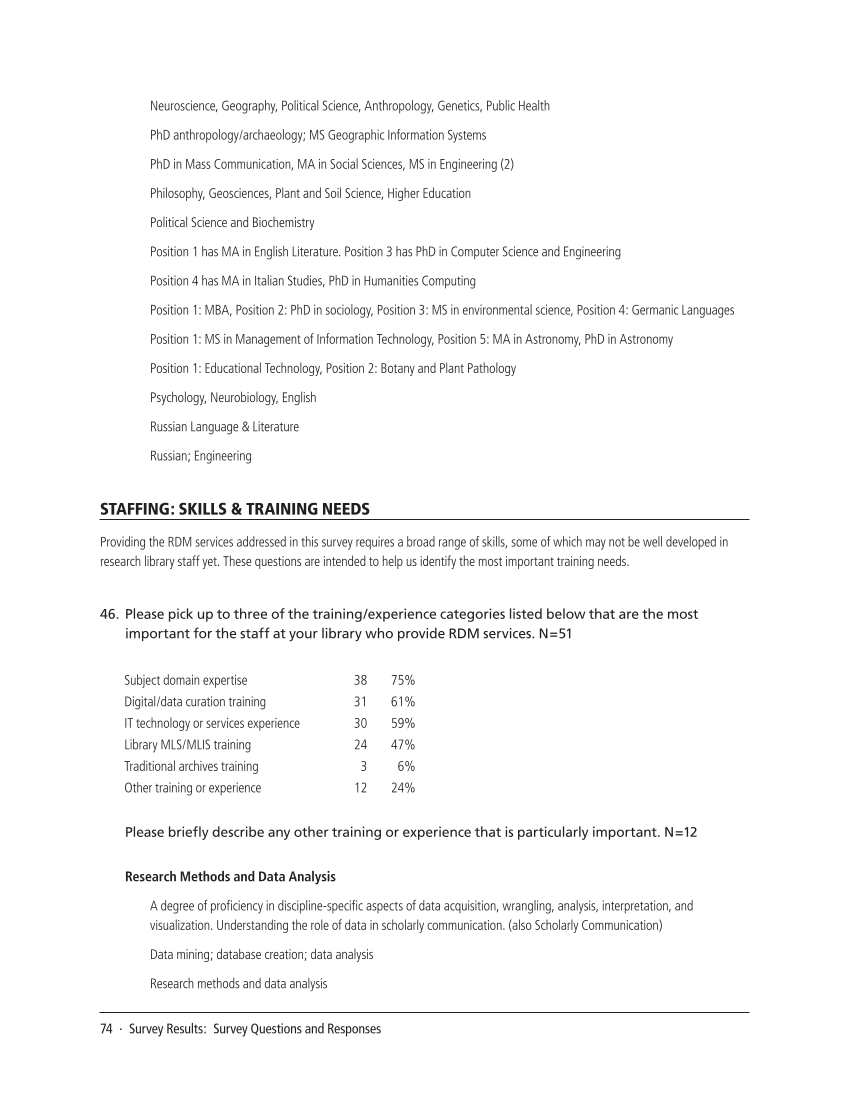74 · Survey Results: Survey Questions and Responses
Neuroscience, Geography, Political Science, Anthropology, Genetics, Public Health
PhD anthropology/archaeology MS Geographic Information Systems
PhD in Mass Communication, MA in Social Sciences, MS in Engineering (2)
Philosophy, Geosciences, Plant and Soil Science, Higher Education
Political Science and Biochemistry
Position 1 has MA in English Literature. Position 3 has PhD in Computer Science and Engineering
Position 4 has MA in Italian Studies, PhD in Humanities Computing
Position 1: MBA, Position 2: PhD in sociology, Position 3: MS in environmental science, Position 4: Germanic Languages
Position 1: MS in Management of Information Technology, Position 5: MA in Astronomy, PhD in Astronomy
Position 1: Educational Technology, Position 2: Botany and Plant Pathology
Psychology, Neurobiology, English
Russian Language &Literature
Russian Engineering
STAFFING: SKILLS &TRAINING NEEDS
Providing the RDM services addressed in this survey requires a broad range of skills, some of which may not be well developed in
research library staff yet. These questions are intended to help us identify the most important training needs.
46. Please pick up to three of the training/experience categories listed below that are the most
important for the staff at your library who provide RDM services. N=51
Subject domain expertise 38 75%
Digital/data curation training 31 61%
IT technology or services experience 30 59%
Library MLS/MLIS training 24 47%
Traditional archives training 3 6%
Other training or experience 12 24%
Please briefly describe any other training or experience that is particularly important. N=12
Research Methods and Data Analysis
A degree of proficiency in discipline-specific aspects of data acquisition, wrangling, analysis, interpretation, and
visualization. Understanding the role of data in scholarly communication. (also Scholarly Communication)
Data mining database creation data analysis
Research methods and data analysis
Neuroscience, Geography, Political Science, Anthropology, Genetics, Public Health
PhD anthropology/archaeology MS Geographic Information Systems
PhD in Mass Communication, MA in Social Sciences, MS in Engineering (2)
Philosophy, Geosciences, Plant and Soil Science, Higher Education
Political Science and Biochemistry
Position 1 has MA in English Literature. Position 3 has PhD in Computer Science and Engineering
Position 4 has MA in Italian Studies, PhD in Humanities Computing
Position 1: MBA, Position 2: PhD in sociology, Position 3: MS in environmental science, Position 4: Germanic Languages
Position 1: MS in Management of Information Technology, Position 5: MA in Astronomy, PhD in Astronomy
Position 1: Educational Technology, Position 2: Botany and Plant Pathology
Psychology, Neurobiology, English
Russian Language &Literature
Russian Engineering
STAFFING: SKILLS &TRAINING NEEDS
Providing the RDM services addressed in this survey requires a broad range of skills, some of which may not be well developed in
research library staff yet. These questions are intended to help us identify the most important training needs.
46. Please pick up to three of the training/experience categories listed below that are the most
important for the staff at your library who provide RDM services. N=51
Subject domain expertise 38 75%
Digital/data curation training 31 61%
IT technology or services experience 30 59%
Library MLS/MLIS training 24 47%
Traditional archives training 3 6%
Other training or experience 12 24%
Please briefly describe any other training or experience that is particularly important. N=12
Research Methods and Data Analysis
A degree of proficiency in discipline-specific aspects of data acquisition, wrangling, analysis, interpretation, and
visualization. Understanding the role of data in scholarly communication. (also Scholarly Communication)
Data mining database creation data analysis
Research methods and data analysis




























































































































































































































